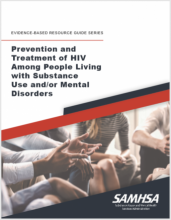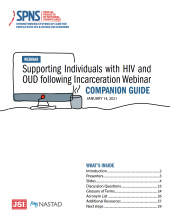
This document describes the critical role that peers have in developing and delivering care for people with HIV and OUD and how a state’s Medicaid program can serve as an essential fiscal resource in supporting peer services.



This document describes the critical role that peers have in developing and delivering care for people with HIV and OUD and how a state’s Medicaid program can serve as an essential fiscal resource in supporting peer services.
This tool aims to assist HIV primary care teams that work in a range of clinical settings to develop and provide enhanced integration of behavioral health (BH) services.
This discussion guide is intended to elicit a comprehensive and concrete conversation about language, stigma, and discrimination as a means of strengthening care systems and ensuring that people who seek care for HIV and/or substance use disorders, including opioid use disorder, are treated with
This ready-to-use training package is designed to provide HIV providers (including physicians, dentists, nurses, therapists, social workers, counselors, specialists, and case managers) with an overview of the challenges and strategies for change in working with
This month’s Connecting Care episode discusses the impact of structural racism at the intersection of HIV and OUD care and opportunities to think outside of the box to effect change.
This glossary includes terms describing key concepts and components of the HIV and opioid use disorder (OUD) care and treatment systems.
In May, the New England AIDS Education Training Center (NEAETC) published a set of pages dedicated to providing information about and resources for HIV and HIV-related topics.
This document provides a quick overview of the federal discretionary funding programs that support essential aspects of the nation’s HIV response.
For Boston Health Care for the Homeless nurse Megan Sonderegger, providing client-centered care means literally meeting her clients where they are.